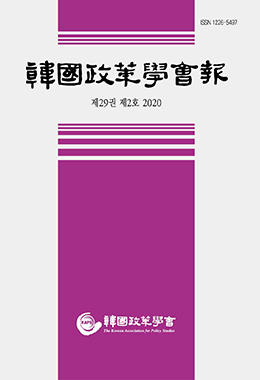우리의 삶을 제약하는 권력의 다층성을 반영할 수 있는 모형을 제시하고, 이를 통계적으로 검증해보고자 하였다. 특히, 권력을 개인-사회라는 큰 양극단으로 구분하고 그 중간에 제도라는 공식화된 제약을 위치시킴으로써 3가지의 권력유형 구분을 시도하였다. 현실 적합성을 반영하는 다양한 권력의 모습을 명료하게 구분할 수 있다는 것이 이 모형제안의 이유였다. 각 요소를 대변하는 ‘힘’을 성공의 요소라고 조작화하여 “2017 서울시 도시정책지표 조사”의 항목을 분석자료로 활용하였다. 고차요인분석을 활용해 분석한 결과 다음과 같은 시사점을 얻을 수 있었다.
우선, 권력 다양성의 지표 중 가장 부합도가 높은 하위개념은 개인권력으로 확인되었으며, 사회권력도 높은 수준이었다. 사회에서 성공이라는 목표, 결과, 또는 성과를 성취하는데 있어서 개인이 내재한 ‘힘’이 가장 크게 영향을 미친다고 인식하고 있음을 의미한다. 둘째, 성공을 위해 갖추어야 할 ‘힘’ 중 개인차원에서는 ‘부유한 집안 출신’과 ‘부모의 교육수준’이, 제도차원에서는 ‘사회체제 수용도’가, 사회차원에서는 ‘정치적 연고’와 ‘뇌물을 주는 것’이 각 상위요인의 중요지표로 확인되었다. 이러한 결과는 우리가 성공을 위해 갖춰야 할 ‘힘’이 공정하고 절차적인 획득이 불가능한, 태생적이고 비규범적인 요소로 인지되고 있음을 보여주는 부분이다.
We wanted to present a model that could reflect the multilevelity of power that constrains our lives, and to verify it statistically. In particular, three types of power types were attempted by dividing power into large extremes of individual-social, and by placing formal restrictions on the system in the middle. The reason for this model proposal was that it could clearly distinguish between the different aspects of power reflecting the suitability of reality. The ‘power’ representing each element was manipulated as a factor of success and the items in the “2017 Seoul Metropolitan Government Urban Policy Indicators Survey” were used as analysis data. As a result of the analysis using the higher-order factor analysis, the following implications were obtained:
First of all, the subconcepts with the highest degree of conformity among indicators of power diversity were identified by individual power, and social power was also high. It means that in society the goal, outcome, or achievement of success is perceived as having the greatest impact on the ‘power’ of the individual achievement. Second, among the ‘power’ to have for success, ‘from wealthy families’ and ‘education level of parents’ were identified as important indicators of each higher factor at the institutional level, ‘social system acceptance’ at the institutional level, and ‘political association’ and ‘giving bribes’ at the social level. These results show that the ‘power’ we need to have for success is perceived as a natural and non-standard factor that cannot be obtained fairly and procedural.


